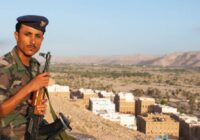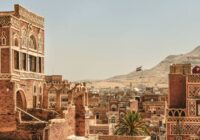The hopes and dreams of Yemen’s youth have been crushed. Omar Mashjari explains.
“Where will we be five years from now?” was the question that Yemeni youth had in their minds. The year was 2011 and the days were revolutionary—the Arab Spring in full force. With long-standing dictators overthrown in Tunisia and Egypt, many thought that the days of Yemen’s long-reigning president, Ali Abdullah Saleh, were numbered too.
The streets of Sanaa were overcome with a sense of optimism. To the protesters, the educated and even the old, it felt like anything was possible. For the first time in modern history, it seemed like their Yemen, one they had dreamt of, was finally within grasp.
After months of protests, the Yemeni Revolution of 2011 managed to remove President Saleh from power—in some shape or form. Saudi Arabia, with its mighty influence, negotiated Saleh a free pass: immunity from prosecution and continued residence in Yemen in exchange for his resignation.
Under the terms of this fatally-flawed Gulf Cooperation Council (GCC) agreement, Abd Rabbuh Mansur Hadi, Saleh’s vice president, would become the head of state for an interim period of one year until elections could be held. But the polls never took place and, with the chaos of a civil war, one year soon became five. Today, Hadi remains president, if only in title and not in form.
From the outset, commentators predicted that the GCC agreement would only serve the interests of Saudi Arabia, not Yemen. They were wrong. The GCC deal was disastrous, but in equal measure for the Saudis and Yemenis. By allowing Saleh to remain in the country, the Saudis afforded him an opportunity to develop a strategy to seize power by force—the first element of which was the establishment of a loyal force only answerable to him.
Using the millions of dollars looted from government funds over the years, Saleh bought the loyalty of soldiers from the most well-equipped and well-trained divisions of Yemen. Ironically, many of these now pro-Saleh soldiers were trained by British and American forces as part of the West’s counterterrorism program in the country before the revolution.
While the second part of Saleh’s strategy needed to be implemented with the upmost precision, he required a public face for his plan—preferably not his own. The Houthis, a Shia rebel group from northern Yemen, provided the perfect partnership for the former president to realize his ambition. Despite Saleh fighting the Houthis when he was in power, enemies became friends almost overnight.
In September 2014, Houthis captured Sanaa in an effort to overthrow Hadi using Saleh’s own forces. The mighty combination of the Houthis and Saleh set their sights on capturing the whole country. They commenced their first incursion into southern Yemen where President Hadi had sought refuge in the port city of Aden, only to be evacuated to Saudi Arabia for a number of months as Riyadh built a coalition to bomb Yemen.
The Saudis took Saleh’s betrayal personally and started a largely ineffective air campaign. After nearly one year of war and over 6,100 deaths, the Saudi-led coalition has not defeated the Houthi insurgency. Only after the establishment of a local “resistance” force consisting of rag-tag fighters did the coalition manage to recapture the city of Aden.
The war is costing the Saudi-led coalition an estimated $200 million a day, and yet there have only been modest returns—the Houthis and Saleh still control most of Yemen. Negotiations in Switzerland between the Houthis/Saleh and the “legitimate” government are going nowhere fast, and leaked emails from Ismail Ould Cheikh Ahmed, the United Nations (UN) negotiator, describe how the Houthis believed they had the upper hand on the battlefield and could, therefore, achieve more with violence than negotiations.
These talks are now stalled, with Ahmed noting the lack of commitment from the Saudis toward the UN-led process. The cause is probably due to the expansion of military operations and the coalition’s belief that it now holds the momentum. Whether this is the case remains to be seen, but even the most skeptical observer can appreciate that the status quo of the war and the deteriorating humanitarian crisis can only last so long.
Where Now?
Five years on from the revolution of 2011, Yemenis look back with dismay. In particular, it is the youth, the key instigators of the protests, who carry the heaviest of hearts. After all, it is the youth who will bear the cost of this war.
The key to understanding the mind frame of today’s leaders in Yemen is Saleh. To him, Yemen was a birthright. Having unified the country, he was determined to treat it like the family Rolex and bequeath it to his eldest son. If this wasn’t possible, he was determined to destroy it so no one could have it.
But Yemen is much greater than Saleh or anyone else who seeks to ravage it. The saying goes that Yemen is so old that it has its own wisdom. Yemenis hope that those who will truly realize this wisdom are the youth. Perhaps then the democratic aspirations of the revolution will be accomplished.
The views expressed in this article are the author’s own and do not necessarily reflect Fair Observer’s editorial policy.
Photo Credit: Ash Carter
 We bring you perspectives from around the world. Help us to inform and educate. Your donation is tax-deductible. Join over 400 people to become a donor or you could choose to be a sponsor.
We bring you perspectives from around the world. Help us to inform and educate. Your donation is tax-deductible. Join over 400 people to become a donor or you could choose to be a sponsor.
Support Fair Observer
We rely on your support for our independence, diversity and quality.
For more than 10 years, Fair Observer has been free, fair and independent. No billionaire owns us, no advertisers control us. We are a reader-supported nonprofit. Unlike many other publications, we keep our content free for readers regardless of where they live or whether they can afford to pay. We have no paywalls and no ads.
In the post-truth era of fake news, echo chambers and filter bubbles, we publish a plurality of perspectives from around the world. Anyone can publish with us, but everyone goes through a rigorous editorial process. So, you get fact-checked, well-reasoned content instead of noise.
We publish 2,500+ voices from 90+ countries. We also conduct education and training programs
on subjects ranging from digital media and journalism to writing and critical thinking. This
doesn’t come cheap. Servers, editors, trainers and web developers cost
money.
Please consider supporting us on a regular basis as a recurring donor or a
sustaining member.
Will you support FO’s journalism?
We rely on your support for our independence, diversity and quality.







